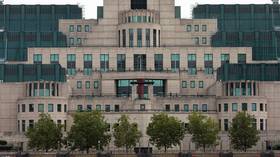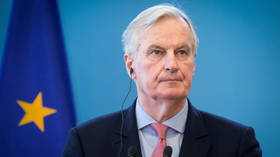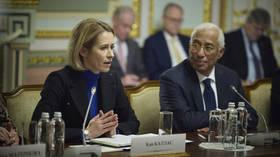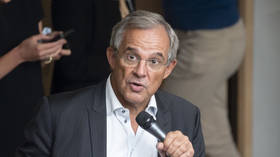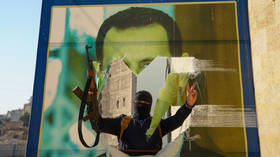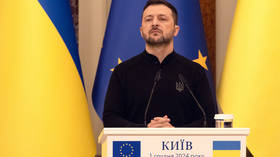EXCLUSIVE: Amid ‘political repression,’ Ukraine becoming American ‘colony’ in Europe, says sanctioned opposition leader Medvedchuk
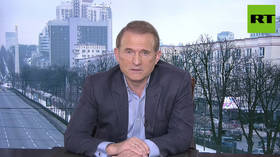
A few weeks ago, Viktor Medvedchuk was celebrating as his party, Ukraine’s largest opposition bloc, topped a nationwide opinion poll. Now, he’s facing charges of funding terrorism that could land him behind bars for over a decade.
In an exclusive interview with RT, the MP and chairman of Opposition Platform — For Life, which advocates better ties with Moscow, insisted that the allegations were a tool of political persecution.
According to him, they are part of a wider pattern of repression linked to Kiev’s recent moves to shut down Russian-language media that has been critical of President Volodymyr Zelensky’s government. The embattled administration has seen its approval ratings nosedive amid worsening economic woes and a chaotic response to the Covid-19 pandemic.
Very serious accusations
Last week, the country’s National Security and Defense Council announced it would seize properties belonging to seven people, including multimillionaire Medvedchuk and his wife, TV presenter Oksana Marchenko, for allegedly financially supporting terrorist organizations. Details of the charges have not yet been made public, but they could carry a 10-12 year prison sentence if he is found guilty.
“These are very serious accusations,” the politician said. “Especially given they are without any foundation at present.” The sanctions, he argued, “are expressly prohibited” by Ukrainian law and in contravention of the Constitution.
Also on rt.com Zelensky wants to establish ‘dictatorship’ says Ukrainian opposition leader, as Kiev bids to put him behind bars on terror charges“Unfortunately, [prosecution for] crimes like treason and espionage is commonplace. Just as at one time there was a charge of hooliganism, now we can be charged with treachery or spying,” he said. However, despite believing his political opponents are abusing the justice system, any suggestion that the man once described as Russian President Vladimir Putin’s ‘favorite Ukrainian’ might flee abroad gets short shrift. “In spite of all of this, I feel like I’m ready to fight – to fight against arbitrariness, against repression, against falsification… I am prepared to stand up to these threats," he said.
Just a few hours before Medvedchuk spoke to RT, the Kiev-based research group Rating published a poll which they claim shows more than half of all respondents across the country supported the action against the politician and his family. “They say 58 percent agree with the sanctions, but they have not seen any evidence or arguments,” he said incredulously. “So, what can you really say about this figure?”
Again though, he refuses to write off the prospects of healing political divisions in a country where more than half of the population would seemingly relish the prospect of putting him behind bars. “The split can be overcome,” Medvedchuk insisted, “because the East-West divide has existed for a long time. Since independence, even. Yes there are regions… that differ in mentality and attitudes, but that’s not such a terrible thing if there is a wise state policy with solid structures and good governance.”
“We can find shared ground when it comes to the development of the country’s economy, its social sphere, income growth and prosperity.”
External influence
As one of the flag bearers for a return to Ukraine’s pre-2014 foreign policy, which pursued closer relations with Moscow until the bloody events of the Maidan uprisings, Medvedchuk is often characterized as being ready to give away the country’s independence to the Kremlin. However, he insists that it is Zelensky’s government, and its Western allies, that presents the real threat to Ukrainian nationhood.
“We live in an independent sovereign state,” he said. “Or, at least, we used to live in one. Now, both independence and sovereignty are being undermined by external influence and most importantly by external political systems imposed by Washington.”
Also on rt.com Washington joins crusade against free speech, backs Ukrainian crackdown on opposition media as EU & Zelensky’s dad voice concernsThe American embassy in Kiev raised eyebrows internationally earlier this month when it backed an order signed by Zelensky’s government to shut down a group of television channels and news sites owned by one of the country’s elected MPs, Taras Kozak, a member of Medvedchuk’s party. In a media landscape dominated by wealthy oligarchs, Kozak’s ‘Novosti’ media empire carved out a niche with Russian-language programming made and broadcast in Ukraine. Around one in three people in the country speak the language natively at home, and the vast majority of Ukrainians could be considered fluent. Despite this, under laws put in place in 2014, swathes of programming in Russian from Ukraine's vast eastern neighbor are already banned.
“When you see that the US Embassy supported both the closure of the channels and the sanctions against me,” Medvedchuk said, “it causes real outrage.” He explained that Washington is “used to creating the image that they are the paragon of democracy, but it is their authorities who have imposed external governance and who are now running Ukraine as their colony,” adding, “They will of course target those who push back against external influence.”
The opposition leader reiterated that 2014 was the turning point, explaining that, since then, “the US has imposed its political power, and it has not benefitted my country or the Ukrainian people… nor will it ever be able to.”
Only a court of law can judge us
The shuttering of the Novosti Group’s media channels, Medvedchuk claims, was an extrajudicial act of repression. Having the backing of the country’s National Security and Defense Council, the same body that ordered the most recent sanctions against him, is not sufficient under Ukrainian law, he maintains.
“Did the Security Council have the right to sign a decree after applying restrictions and blocking channels? No!”
Three broadcasters were taken off air almost immediately and several news sites were banned, which Medvedchuk, who holds a doctorate in legal practice, says was unlawful. “There is nothing in the sanctions that enables them to stop broadcasting, or stop internet resources," he said. “The law knows no such sanctions.”
At the time, Mikhail Podolyak, an adviser to Zelensky, explained the move, saying, “it’s clear that sanctions on Mr. Medvedchuk’s TV channels are not about the media and not about freedom of speech… it’s just about effectively countering fakes and foreign propaganda.” Without action, he argued, the opposition media would “kill our values.”
Also on rt.com Free speech-loving Western journos cheer as Ukraine charges ‘sh*t-stirring’ blogger with TREASON for ‘discrediting state policy’Medvedchuk, however, rejects this as arbitrary and political, when only a judicial decision should apply. “They should go legal,” he insisted. “If you think someone is wrong, go to court. The channels can be defended in court – those who think there are arguments can present them. It is the court that decides who is right and who is wrong, not you, not me, or a government representative who thinks it is bad for the interests of the country when I say it is good for the interests of the people.”
“Only a court of law can judge us,” he concluded. “This is the procedure in all legal systems, and this is real, effective democracy. Everything else is evil!"
The American Embassy in Kiev, however, insisted that the move was “in line with Ukrainian law,” and that it supported Zelensky’s efforts “to counter Russia’s malign influence.”
“We must all work together to prevent disinformation from being deployed as a weapon in an info war against sovereign states,” a tweet from the diplomats argued.
Violating the principles of democracy
When the sanctions against him were first announced, Medvedchuk issued a fiery statement in which he accused the president of taking the country “down the path of establishing a “dictatorship and usurping power.” The government was, he insisted, “seeking to crack down on the parliamentary opposition legally elected by the Ukrainian people.”
No matter how evocative that rhetoric might be, however, the reality is that few in the West can imagine Zelensky as a budding despot, at least at the moment. When elected with more than 73 percent of the vote in 2019 after an unlikely rise from television celebrity to politics, he declared that he would only ever serve one term in the top job.
When pushed on whether his political opponent would really go back on that pledge, Medvedchuk insisted that “it all still looks cloudy and foggy.” However, Zelensky’s plans would become clearer, he said, at the next elections. But, in either case, whether the incumbent would succeed in a re-election bid, he said, “I have my doubts.”
The president’s falling popularity, which has seen support for his party drop in a recent poll to around half the level of Medvedchuk’s, “is the result of unprofessional management of the economic and social spheres, as well as the fight against coronavirus,” he said. “It is because of the lack of peace that he promised in the elections, the lack of return of Donbass to Ukraine.”
“And I think that political repression, the establishment of a dictatorship, the closure of channels, the policy of discrimination against the Russian language, the policy of Russophobia and the policy of usurping power are the result of him struggling to maintain and increase his authority and his ratings,” the opposition leader continued. “This is exactly the kind of illegal and unconstitutional way that violates the current legislation of our country, going out of the legal framework and really violating all the principles of democracy.”
European values
For all Medvedchuk’s talk about Zelensky’s undermining of Ukrainian democracy, the country’s president would likely throw those accusations straight back at him. Advocates of a tough line against both Russia and those Kiev politicians who seek better ties with the country argue that the Kremlin will always pose an existential threat to Ukraine’s nationhood.
Unless it finds its own distinct identity, they argue, through elevating the Ukrainian language and advocating an interpretation of the country’s history as separate to Moscow’s, it will forever be sucked into the orbit of its far larger neighbor. The Russian-language broadcasters that Medvedchuk points to as an example of Kiev’s growing autocracy are, to Zelensky’s supporters, a leash that would lead the country back to control from the East. For them, Ukraine’s future lies only in turning to the West.
The opposition leader, however, shrugged off the suggestion that the country could strengthen the president’s ambitions to join Western institutions like the EU and NATO by simply blocking opposing voices. “When he says he is leading the way to European democracy and is trying to break down the barriers to that, it is just seen as utter absurdity,” the MP argued. “If this democracy is about closing down channels alone, then I don't know what his idea of European democracy is. European democracy has a mechanism for stopping broadcasting – and we’ve already talked about it – through the courts.”
“But what Zelensky is doing – imposing sanctions on his citizens, restricting constitutional rights extrajudicially, shutting down broadcasters illegally – is not democracy, European or otherwise,” he added. “This is the establishment of dictatorship and a way to seize power.”
“Note that the resolution adopted by the European Parliament in matters related to the association agreement between Ukraine and the EU, in several paragraphs it explicitly states that there can be no extrajudicial closure of television broadcasters. There can be no politically motivated action against the opposition – this is also explicitly stated.”
The Ukrainian Ministry of Justice was approached for comment on whether the sanctions against politicians and broadcasters were within the law. No response has been received.
Though Medvedchuk and Zelensky might lead warring factions, they share the same country, divided as it is. The great irony would be if, by trying to break the deadlock between them with promises of a bright, liberal and democratic future, the president and his supporters delivered the kind of autocracy that they have always accused the other side of wanting to install.
Think your friends would be interested? Share this story!



